Conscious consumerism is a top priority for homeowners
Considering your impact on the wider world is becoming more commonplace in the UK. Rising energy prices, ecological damage or unethical manufacturing practices are particularly contributing to changes in buying habits.
A conscious consumer considers the wider ethical, environmental, political, and social impact of their purchases. Examples of conscious consumerism include, choosing reusable packaging, buying fair trade produce, choosing quality and longevity over a low budget, and avoiding fast fashion or similar trends. In fact, 91% of British homeowners were aware of conscious consumer values (Origin Trade, 2023).
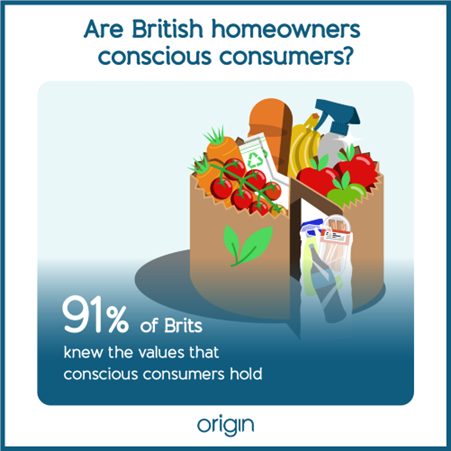
We asked 152 British homeowners (Origin Trade, 2023) about conscious consumerism and found interesting results. This article reflects on our unique findings on responsible purchasing for the home. We discuss the most important values for homeowners and how you can identify an ethical brand. Finally, we explain the benefits of Origin Internal Doors (OI-30) for modern homeowners.
Click on a link to jump to that section:
Most Brits are conscious consumers looking to make better home choices.
Identify accreditations of ethical and sustainable practices
Reduce energy consumption and improve natural lighting with internal room dividers.
Origin Internal Doors meet the needs of the modern conscious consumer in the UK .
What values are important to homeowners?
57% of British homeowners (Origin Trade, 2023) could identify conscious consumerism in the home. We presented them with examples of conscious consumerism and greenwashing; the majority of respondents could recognise responsible purchasing.
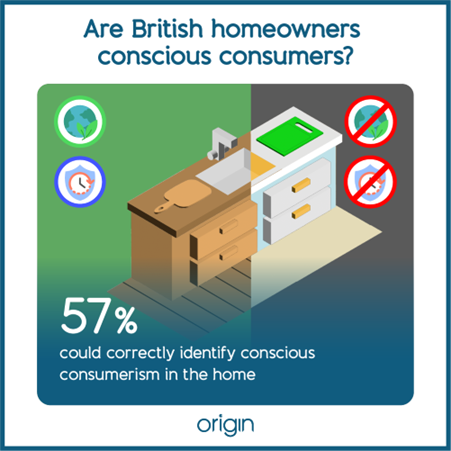
Moreover, the majority (58%) agreed that buying higher quality materials, built to last, is better than buying low-quality items that you will inevitably need to replace.
Finally, we asked our cohort to rank six factors in order of importance. They ranked 'choosing long-lasting materials; in third place overall, 'buying responsibly sourced materials' came second, and energy-saving was ranked the highest.
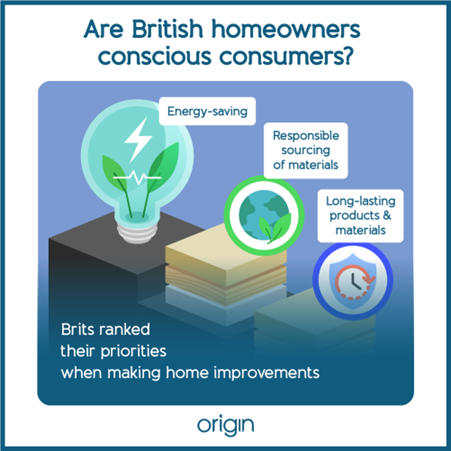
In fact, energy-saving took the top spot for 29% of respondents, 24% ranked responsible sourcing the highest, and 15% prioritised 'buying for longevity' or 'buying locally'. As we can see from these results, responsible purchasing values are important to consumers and, in many cases, outweigh rigid adherence to low budgets.
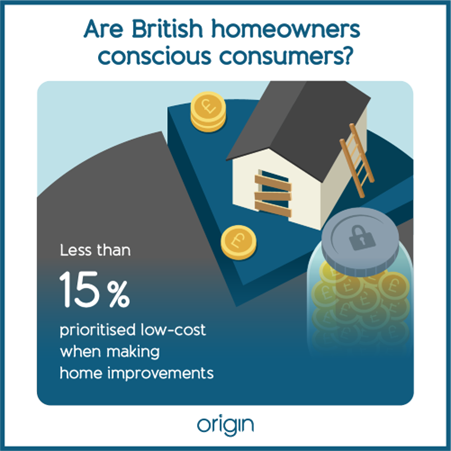
How can you determine whether a brand is ethical?
Modern homeowners value quality products that are responsibly sourced and have a smaller impact on the wider world, so you should consider choosing a supplier who provides this. We explore how to differentiate ethical brands that value quality and responsible sourcing from ones that take advantage of the recent shift in buying habits.
‘Greenwashing’ refers to when a business uses false, misleading, or untrue claims to promote its positive impact on the environment. Some corporations exaggerate their sustainability credentials and use eco-friendly messaging to market unsustainable products towards sustainably-minded shoppers. Greenwashers understand the importance of meeting the needs of modern shoppers, while failing to create a product to match the marketing.
Meanwhile, organisations that value quality, longevity, sustainability and responsible sourcing are subject to much of the same scrutiny. You want to look for suppliers endorsed by reputable third-party organisations. The following accreditations are also a good place to start with identifying a responsible supplier.
- ISO 9001 – this quality management certificate is used for monitoring, managing and improving product and service quality. With this certificate, you can be confident that your supplier offers consistent quality
- ISO 14001 – this environmental management certification helps businesses reduce environmental impact by identifying, monitoring, and controlling environmental processes and waste management. This certificate makes up part of an ongoing effort to manufacture more sustainably.
- ISO 45001 – if you see this certificate, the organisation is continuously monitoring and improving occupational health and safety.
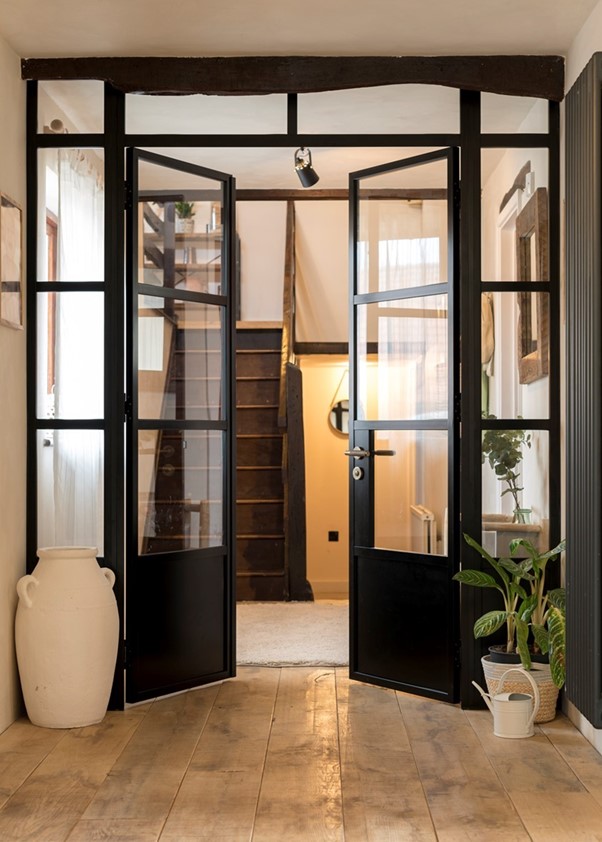
The energy-saving benefits of internal doors
According to our study, energy efficiency was the number one priority in British homeowners (Origin, 2023). Manufacturers and tradespeople should be meeting this growing consumer demand. With rising energy rates and the cost-of-living crisis, it's no wonder that consumers are looking for sustainable materials that also help them save on their energy bills.
Homeowners can make sustainable changes to their homes without demolishing existing structures by installing internal doors and room dividers. Open-plan layouts were popularised in the 80s to create the illusion of more space in small dwellings. However, many homeowners are becoming savvy to their low energy efficiency. Not to mention, the rise of home and hybrid working has created the need for ‘zones’ in the home.
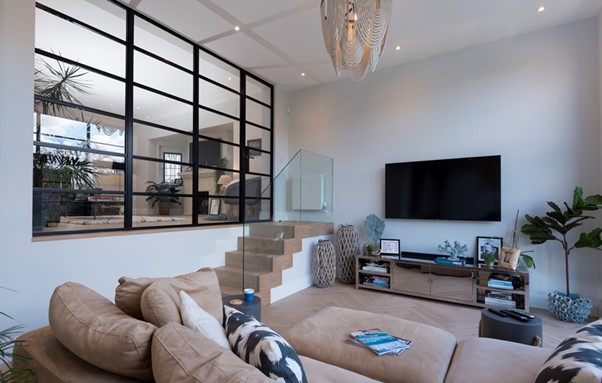
You can install Origin Internal Doors in any room or hallway . They help reduce heating costs because you needn't heat large spaces. Origin room dividers allow natural light to travel between rooms but create distinct zones. We update all our designs to stay ahead of the U-value regulations and future-proof British homes. A broken-plan concept can satisfy advocates for both open and closed-plan living, helping to improve the longevity of these bespoke features.
Why homeowners are choosing Origin Internal Doors
We provide stylish, bespoke features that not only meet each customer's unique requirements but contribute to reducing the impact of home improvements. Modern homeowners choose Origin Doors for the following reasons.
- Ahead of the curve U-values
- Responsibly-sourced materials (BES 6001 certified since May 2023 )
- Energy-saving benefits
- All doors have up to a 20-year guarantee
- Slim aluminium sightlines
- Fully customisable colour palettes (choose from over 150 RAL colours)
- Low maintenance structures
- Quality and environmental impact certificates (ISO 14001 & ISO 9001)
- Manufactured in Britain
- Bespoke home fittings
Origin Internal Doors meet the requirements of conscious consumers: responsible sourcing, local manufacture, durability, longevity and sustainability. Customers can also expect attractive features such as narrow aluminium sightlines and fully customisable interior and exterior colours (we have over 150 RAL colours to choose from). We make each bespoke door to order so that it fits perfectly to any aperture. Moreover single and French door styles can fit anywhere in the home.
Our unbeatable lead times set Origin apart from other suppliers. We understand that the expectation to work to strict deadlines leaves little room for errors or supply delays. For this reason, we ensure we can manufacture and deliver a bespoke product within 24 hours if necessary.
Set up a Trade account with Origin today!
What to read next
What are the benefits of supplying Origin Internal Doors?
The benefits of supplying black internal doors and how to choose the right one for your customer
What are the benefits of supplying white Internal Doors from origin?
What are the benefits of supplying grey Internal Doors from Origin?
